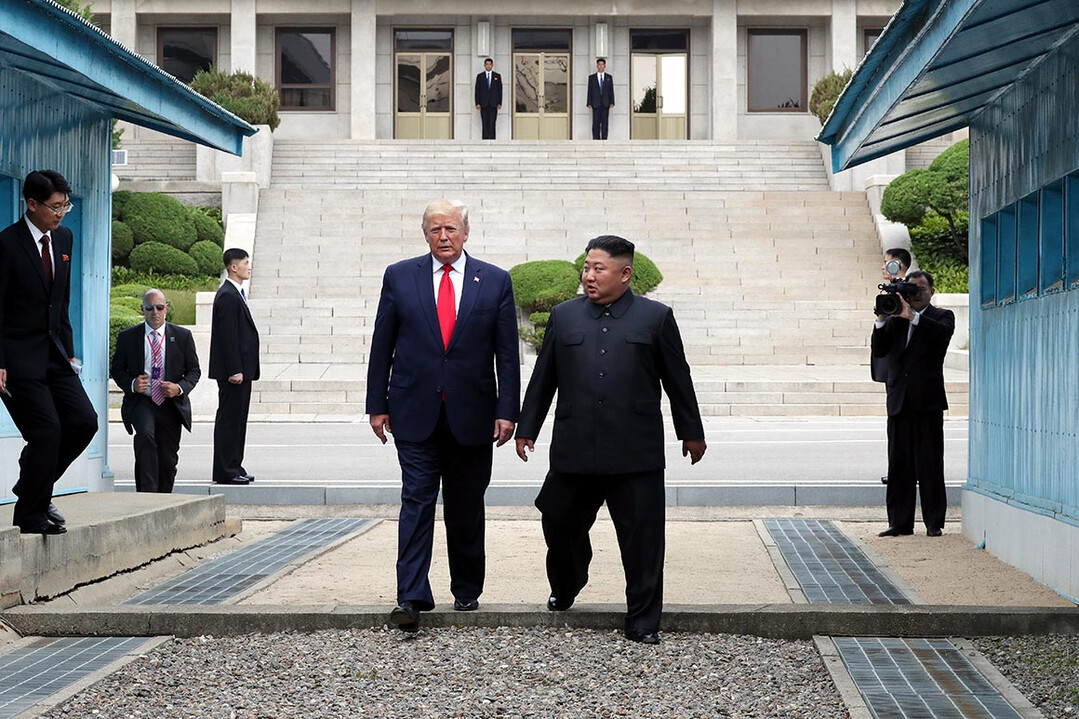
SEOUL—US President Donald Trump has reignited speculation of a surprise summit with North Korean leader Kim Jong Un during his upcoming visit to South Korea, simultaneously offering a diplomatic olive branch by referring to the North as a "sort of nuclear power." The president's remarks, made to reporters aboard Air Force One on October 24, have been interpreted as a clear attempt to entice Kim back to the negotiating table, but Pyongyang's subsequent announcement regarding its Foreign Minister's travel plans suggests a calculated effort to maintain the upper hand.
As Trump embarked on his Asian tour, which includes the ASEAN and APEC summits, he openly expressed his desire to meet with the North Korean leader, stating, "I would like to do that if he'd contact me. He knows we're going there," adding that he was "100% open" to a meeting and that he and Kim "get along very well."
The most significant shift in his rhetoric came when he addressed North Korea's nuclear status. "I think they are sort of a 'nuclear power'," Trump said. "When you say they have to be recognized as a nuclear power, well, they got a lot of nuclear weapons. I'll say that." This statement is seen as a major incentive for Pyongyang, which has consistently insisted on its status as an "irreversible nuclear state." While Trump's use of "nuclear power" does not equate to formal recognition as a legal nuclear-weapon state under the Nuclear Non-Proliferation Treaty (NPT), it closely aligns with Kim's long-sought political objective and serves to elevate the North's global standing. Trump, who is scheduled to visit South Korea on October 29 for a two-day trip, is putting the onus squarely on Kim for a meeting to materialize.
Pyongyang Holds Back, Eyes Negotiation Leverage
Despite Trump's public overture, North Korea has not issued a formal response. Instead, state media announced on October 26 that Foreign Minister Choe Son Hui would visit Russia and Belarus from October 26 to October 28. Given that this itinerary is expected to keep her abroad until after Trump's scheduled departure from South Korea on October 30, analysts suggest this move is an indirect rejection or at least a calculated delay of the proposed meeting. Typically, the foreign minister accompanies the leader at such summits, as was the case during the three previous Trump-Kim meetings in 2018 and 2019.
Experts see this as North Korea's strategy to gain leverage in future US-DPRK negotiations. By holding out, Pyongyang may be calculating that it benefits from a patient approach until the US is willing to modify its goal of "denuclearization." Doo Jin-ho, director of the Eurasia Center at the Korea Institute for National Strategy, interpreted the foreign minister's trip as a "de facto boycott" aimed at consolidating a united front with Russia and Belarus amidst US-Russia tensions over the Ukraine conflict.
However, the possibility of a surprise meeting remains, a hallmark of the Trump-Kim dynamic. Kim Jong Un recently emphasized his "good memories" with Trump, stressing their personal rapport. Furthermore, South Korea's Unification Minister, Chung Dong-young, noted on October 24 that North Korea had recently been conducting cleanup operations in the northern area of the Joint Security Area (JSA) at Panmunjom, a location for one of their previous, surprise encounters. Yang Moo-jin, a professor at the University of North Korean Studies, suggests that if Trump were to send a "more active message" to the North, Choe Son Hui's trip could still be postponed, leaving the door slightly ajar for a last-minute summit.
Ultimately, Trump’s acknowledging the North’s nuclear reality is a powerful incentive, giving Kim the political win he desires. However, Pyongyang appears determined to maximize its strategic advantage, ensuring any potential summit is on its terms.
[Copyright (c) Global Economic Times. All Rights Reserved.]





























